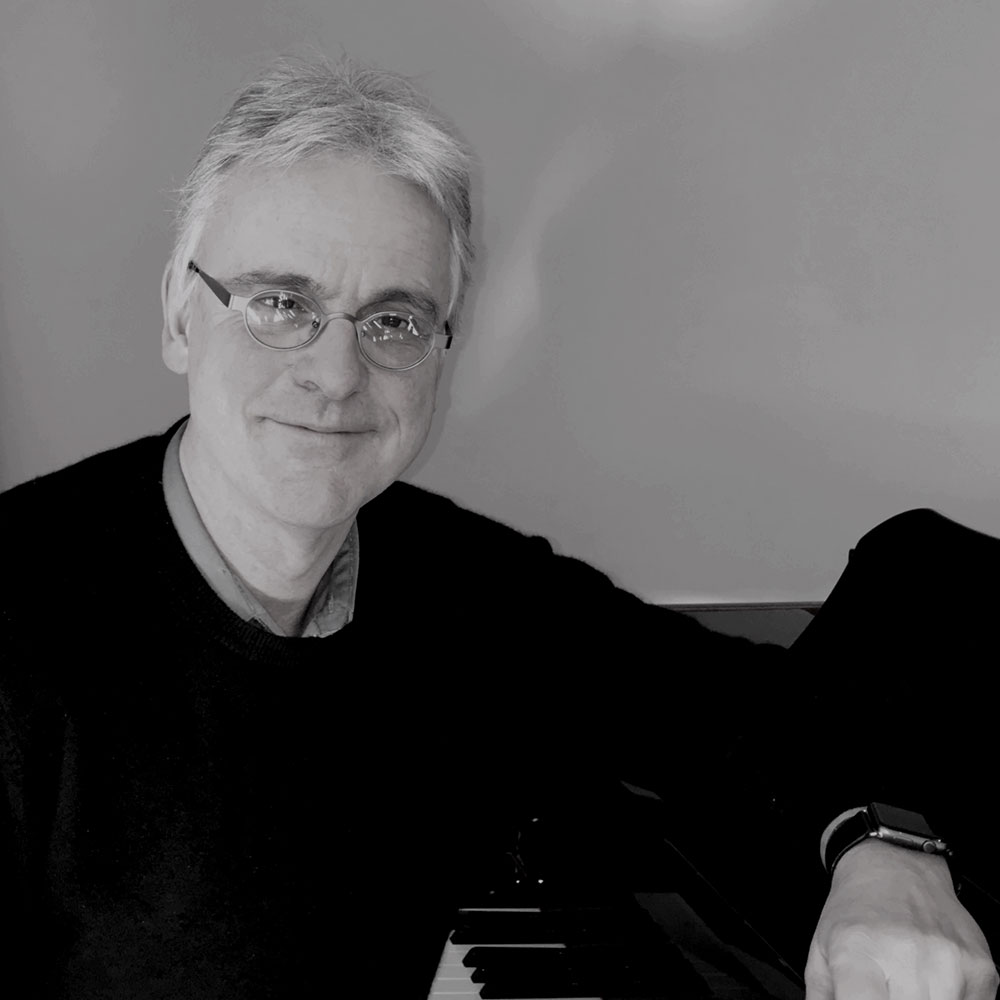Meet Simon Andrews, an English composer who has lived and worked in the US for more than three decades. His multi-faceted career as a composer, conductor, and teacher has earned him a reputation as a creator of eloquent concert music that blends harmonic complexity and lyricism, introversion and broad gestures, and delicate timbres and bold statements.
Today, Simon is our featured artist in “The Inside Story,” a blog series exploring the inner workings and personalities of our artists. Read on to hear about philosophies on music and genres…
When did you realize that you wanted to be a composer?
My parents tell me they knew I would be a musician when I was two, because I would hum radio advertising jingles at the correct pitch, even before I could talk! Being a musician is all I have ever wanted to do. When it became obvious as a teenager that a career as a pianist was not on the cards, I concentrated more on conducting and composing. Winning the Britten Prize in 1985 tipped the balance in that direction, but I have always juggled both.
What is your guilty pleasure?
That I should be guilty about, or just that I am guilty about? Here are a few, and I will let the reader decide what category they are in:
- I’m a huge Liverpool fan (that’s soccer) but will watch just about anyone kicking a ball around
- I lost count of how many times I have read the Lord of the Rings – I still take notes in (boring) meetings in in Elvish
- I am on a personal quest to sample every single malt made in Scotland at least once – the smokier the better!
If you could spend creative time anywhere in the world, where would it be?
I have so many favorite places! Our cabin in rural Maine is one. No cell service, no internet and no TV, right on a lake. I love the Abiquiu area of New Mexico. I even named a piece on the album after a visit there and am currently composing an opera on the Pueblo Revolt. But, if you put a gun to my head and I had to choose just one, I would probably go back to my English roots and choose a small village in the Cotswolds or the Lake District with lots of country walks and a good pub. Being in surroundings that take you out of your every day self and into the world of your imagination is a great head start for beginning a new piece.
What would you say to an artist performing your work that nobody knows?
I would say to forget labels. Critics and academics have almost a fetish for categories: neo- romantic, post modern, neo-tonal, neo-classical, avant-garde (whatever that means today), etcetera, etcetera. Useful in a text book, perhaps, but they pre-condition us to experience music in a specific way rather than trying to discern how to respond to the sound world the composer has created for that piece. I would say, “stay open – listen deeply – then respond.”
Was there a piece on the album that you found more difficult to compose?
Yes, whichever one I was working on at the time! I write very slowly and frequently have two or three versions of a piece going at the same time. During the composing of the last movement of my symphony I think I had eight or nine at one point. It is not until I discern the narrative of the piece that it gets easier.
Composing is like traveling in a country you don’t know without a map. There are so many roads you could take, but which is best? Led Zeppelin said it well: “Yes, there are two paths you can go by, but in the long run, there’s still time to change the road you’re on.” It takes a while to let go of the anxiety that you’re missing something and simply enjoy the route that you’re taking. You make it the right one by taking it.
Is there a specific feeling you want listeners to tune into when hearing your work?
Yes, theirs. I know what my music means for me, but have no idea how a listener will react. I compose music that will take the listener on a journey, if they are willing, but it is their journey, not mine. If I have done my job well it could even be different at each listening. The pieces we come back to again and again (or books, or poems, or paintings for that matter) speak to us on a level that is hard to put into words. That is their strength. It is what, I think, we aim for as composers, to create a sound world that invites the listener back and suggests that there are more treasures to be discovered.

AND THAT MOMENT WHEN THE BIRD SINGS now available through Navona Records for streaming or purchase. Click here to explore the new album.

Simon Andrews is an English composer who is earning a reputation as a creator of eloquent concert music that blends harmonic complexity and lyricism, introversion and broad gestures, delicate timbres and bold statements. His output ranges from large-scale orchestral works and opera to intimate chamber music, with a special delight in chamber music with solo voices. He studied at Oxford University, and the Royal Academy of Music, and gained a Ph.D. from the University of California, Berkeley. Winner of the 1985 Benjamin Britten Prize, his music has been commissioned and performed to critical acclaim on both sides of the Atlantic.
